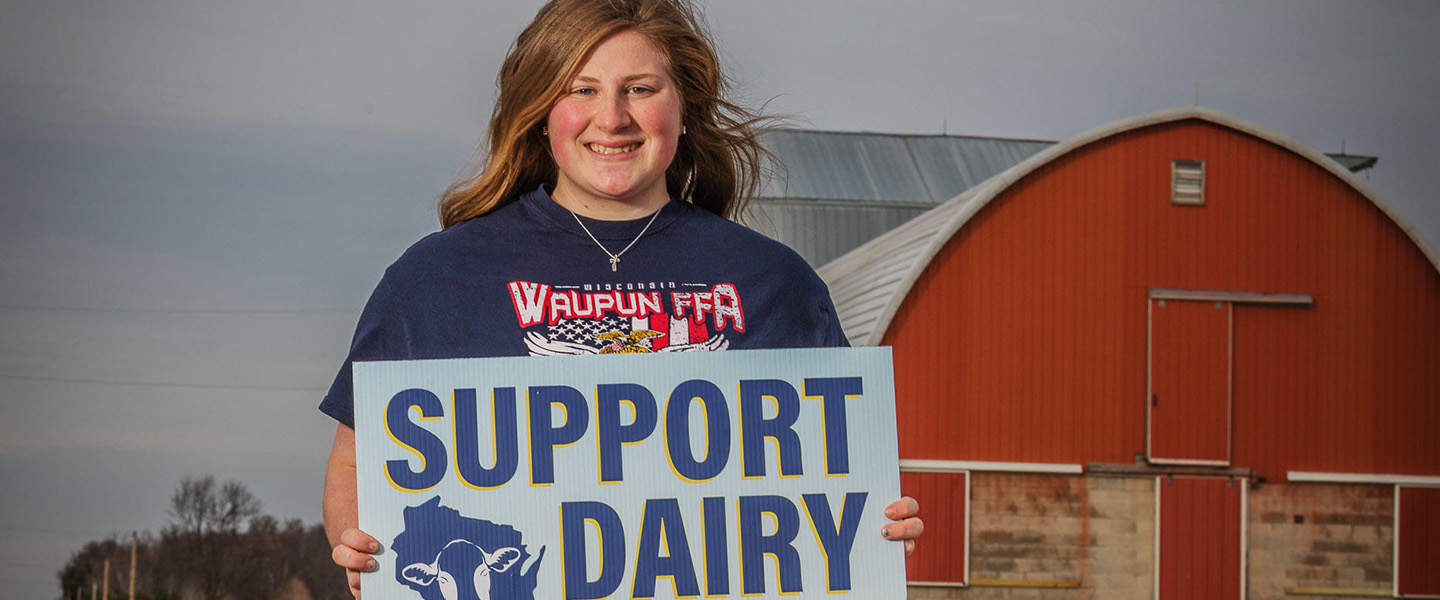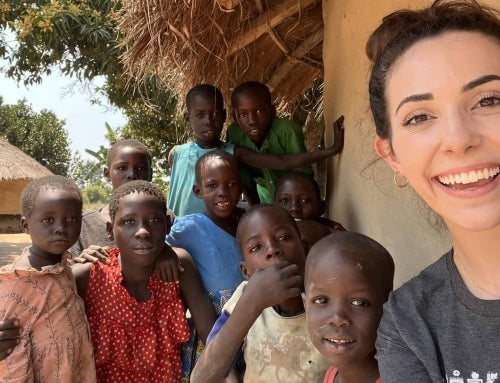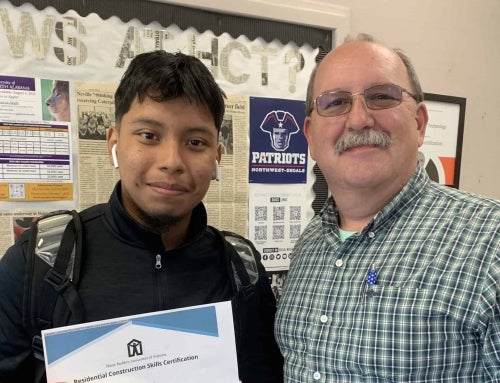When school shutdowns occurred across the country last year because of the COVID-19 pandemic, it left a lot of students – and FFA chapters – in limbo. It wasn’t just the in-person meetings that took a hit. Annual activities that were staples of a chapter’s social and service calendar were suddenly erased.
Yet, as they say, when the going gets tough, the tough get going. That’s precisely what happened for the members of the Waupun FFA Chapter in Wisconsin. Chapter members, officers and advisors turned these challenges into opportunities and, along the way, lived to serve.
“When this all started last spring, we all were in very poor spirits,” Cole Hicken, chapter vice president, says of the pandemic. “There are several things we look forward to every year, like Day on the Farm. And when those things were canceled, we all were disappointed.”
But that’s when the wheels started spinning, and officers and advisors came together to find ways the FFA chapter could continue. “What was happening wasn’t just impact- ing the school; it was impacting the entire community,” Hicken says. “So, we started holding virtual meetings and exchanging text messages to work on something that we could do.”
Seeing Signs
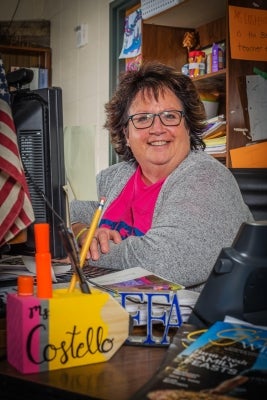
FFA Advisor Tari Costello at her desk in the ag education classroom at Waupun High School.
Located in the heart of dairy country, the Waupun FFA Chapter was intimately familiar with the hardships that dairy producers faced as the pandemic shutdowns started. The entire dairy chain was under stress. That’s when the chapter jumped into action.
It started with $2,400 in seed money. The chapter used that money to print 300 signs with the #DairyStrong hashtag and distributed them throughout the community. “Members wanted to do something to support the dairy industry,” says Tari Costello, Waupun FFA advisor.
Soon, local businesses joined and worked with the chapter to promote and support the dairy industry. The sign campaign expanded, and in the spring and early summer of 2020, the chapter coordinated the distribution of 58,800 pounds of milk, cheese, frozen custard, potatoes, sour cream, butter and more, worth more than $75,000, to the community.
“The amazing part was that through the entire pro- gram, we did not ask for a single donation,” Costello says. “Businesses would call the chapter and ask how they could participate.”
The chapter also supported the school lunch program with cheese and yogurt donated by local processors.
FFA advisor Kris Beaver says that during the giveaways, people would come forward with unsolicited donations. The chapter piled those donations back into the program to keep it going. It expanded to include not only dairy but also beef, pork and vegetables. Beyond simply donating products to the community, it was also working to support producers by purchasing their products. “Every week, we were surprised at the amount of donations we would receive, so we just kept the program going,” Beaver says.
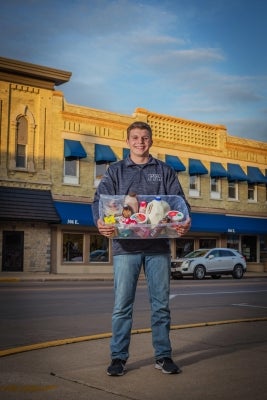
Cole Hicken with the 25-pound dairy product donation basket in downtown Waupun.
The program culminated with the distribution of 25-pound packs of dairy products. It was significant because it marked the first time that students could actively participate in the distribution. Until then, because of COVID-19 restrictions, students worked behind the scenes at the other product giveaways but could not participate in person.
“I did not realize how big the program had grown until that day,” says Alexa Kuhn, chapter president. The town of Waupun isn’t accustomed to traffic jams, but on that day, Main Street was a parking lot. The location where the products were being distributed was packed two hours before members arrived. “That’s when I saw the kind of impact we were having on the community. It was simply amazing,” she says.
But just because the members couldn’t always participate in person didn’t mean they didn’t contribute. Weekly virtual meetings kept members updated on the program, and the members would brainstorm ideas.
“We used a lot of social media to advocate for the pro- gram,” says Hannah Scholten, chapter secretary. “It was tough not to be able to participate physically, but we did what we could, and social media was a tremendous asset.”
The chapter’s work was noticed throughout the state. After the #DairyStrong campaign, the Wisconsin Pork Association approached the chapter for help develop- ing a way for Wisconsin pork producers to distribute their goods due to market disruptions created by the pandemic. The chapter became the first to put together Passion for Pork bundles, and more than 3,000 pounds of pork was sold through the program. “That program was a direct result of the chapter’s efforts,” Beaver says. “The Wisconsin Pork Association reached out to us after hearing about our program.”
The Wisconsin Historical Society has asked for chapter materials to help document how the pandemic impacted the state and how the community responded.
Adapting to the New Normal
“I have to commend our chapter for adapting to what was happening around them,” Costello says. “Instead of throwing up their hands, they looked at the situation and figured out how to make these things happen in spite of the obstacles before them.”
Kuhn says it’s a matter of remaining positive. “FFA and our advisors have taught us that we need to be positive, even in the darkest of times,” she says. “I’ve been stopped by people at our local supermarket because I have my FFA mask on, and they thank our chapter for the program. This would not have happened if we had just waited around. We were proactive and we definitely helped our community.”
Hicken says the program has given him a whole new outlook. “We are here to serve, and the past year has shown us that a chapter can serve its community no mat- ter what obstacles may be in the way,” he says. “I now know that even at the darkest points there is always a light you can find. FFA and my chapter work have helped me see that.”
Meeting Student Needs
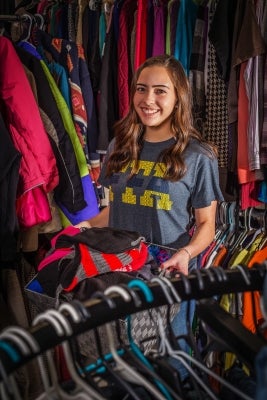
Hanna Scholten in the “Clothes Closet” room at Waupun High School.
While the Waupun FFA Chapter’s #DairyStrong program has been wildly successful in providing a valuable service to the community, the wide-rang- ing impact of the COVID-19 pandemic was not lost on chapter officers.
“Mental health isn’t always discussed, but we wanted to provide students a place to turn if they are having a tough time,” says chapter secretary Hannah Scholten.
So Scholten and Cole Hicken, chapter vice president, are spearheading an initiative to provide more mental health awareness in the school and the community. Screens at school provide information about mental health and resources available. “It’s an issue that’s not often talked about,” Hicken says. “But it’s an issue that’s impacting some students. We want to provide information that can help.”
The chapter also operates the Clothes Closet, a room at the school where students can access clothing and personal hygiene products free of charge. “Students can go there anonymously, so they don’t feel embarrassed, and it has products that they may need but can’t afford,” Scholten says.
Alexa Kuhn, chapter president, says these initiatives aren’t just about agriculture. “They are about community service,” she says.

